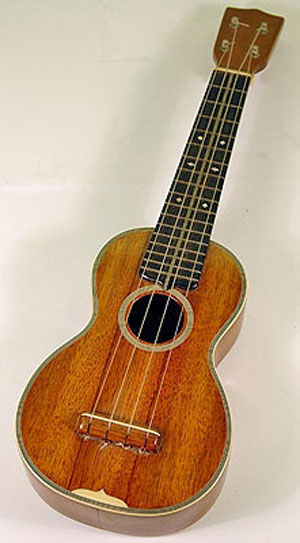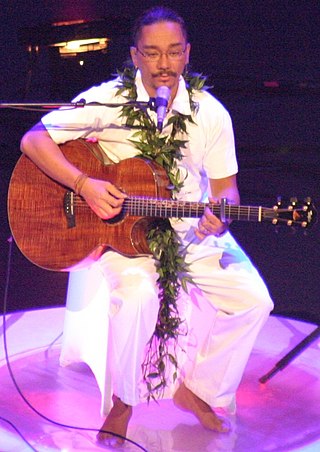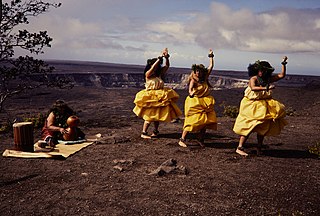
The ukulele, also called a uke, is a member of the lute family of instruments of Portuguese origin and popularized in Hawaii. It generally employs four nylon strings.
The music of Hawaii includes an array of traditional and popular styles, ranging from native Hawaiian folk music to modern rock and hip hop. Styles like slack-key guitar are well known worldwide, while Hawaiian-tinged music is a frequent part of Hollywood soundtracks. Hawaii also made a contribution to country music with the introduction of the steel guitar. In addition, the music which began to be played by Puerto Ricans in Hawaii in the early 1900s is called cachi cachi music, on the islands of Hawaii.

Philip Kunia Pahinui, known as Gabby Pahinui, was a slack-key guitarist and singer of Hawaiian music.

Slack-key guitar is a fingerstyle genre of guitar music that originated in Hawaii. This style of guitar playing involves altering the standard tuning on a guitar from E-A-D-G-B-E, which has been used for centuries, so that strumming across the open strings will then sound a harmonious chord, typically an open major. This requires altering or "slacking" certain strings, which is the origin of the term "slack key". The style typically features an alternating-bass pattern, played by the thumb on the lower two or three strings of the guitar, while the melody is played by the fingers on the three or four highest strings. There are as many as fifty tunings that have been used in this style of playing, and tunings were once guarded fiercely and passed down as family secrets. In the early 20th century, the steel guitar and the ukulele gained wide popularity in America, but the slack-key style remained a folk tradition of family entertainment for Hawaiians until about the 1960s and 1970s during the second Hawaiian renaissance.

Carleton Lewis Kealiʻinaniaimokuokalani Reichel popularly known as Kealiʻi Reichel, is a popular and bestselling singer, songwriter, choreographer, dancer, chanter, scholar, teacher, and personality from Hawaiʻi. He has spent his life educating the world about Hawaiian culture through music and dance.

Lights Out is the debut solo album by Peter Wolf, released in 1984. The album was dedicated "to the memory of Edith Marie Hasselman and Edward Mant Hood".
The Grammy Award for Best Hawaiian Music Album was an honor presented to recording artists from 2005 to 2011 for quality Hawaiian music albums. The Grammy Awards, an annual ceremony that was established in 1958 and originally called the Gramophone Awards, are presented by the National Academy of Recording Arts and Sciences of the United States to "honor artistic achievement, technical proficiency, and overall excellence in the recording industry, without regard to album sales or chart position".

Donald David Guard was an American folk singer, songwriter, arranger and recording artist. Along with Nick Reynolds and Bob Shane, he was one of the founding members of the Kingston Trio.

Tau Moe was a singer and musician who formed The Tau Moe Family musical troupe which toured the globe for decades.
Peter Moon was an American ukulele and slack-key guitar player.

The Brothers Cazimero were a Hawaiian musical duo made up of Robert Cazimero on bass and Roland Cazimero on twelve string guitar. Robert also played piano as a solo musician. The Cazimeros got their start during the Hawaiian Renaissance with ukulele and slack-key guitarist Peter Moon's band, The Sunday Manoa, on their first recording, Guava Jam. Since that time, The Brothers Cazimero have released at least 36 recordings and three DVDs. For three decades, the group performed at the annual Lei Day Concert. They made their Carnegie Hall debut in 1989.

Sean Kekamakupaʻa Lee Loy Browne was born in 1953 and raised on Hawaiian Homestead Lands in Keaukaha, Hilo, Hawaii. A graduate of the Kamehameha Schools class of 1971, he earned his Bachelor’s degree at the University of Redlands in 1975 and his Master of Fine Arts in sculpture from the University of Hawaiʻi at Mānoa in 1983. In 1981 he traveled to Pietrasanta, Italy to study marble carving under Paoli Silverio and was later accepted as an artist-in-residence at Henreaux Marble Company in Querceta, Italy. In 1985 he was awarded a Fulbright Fellowship, enabling him to study stone sculpture under the guidance of Isamu Noguchi in Shikoku, Japan. For many years, Browne taught sculpture at the University of Hawaiʻi at Mānoa and at Kapiʻolani Community College.

Eric Lee is a Hawaiian musician, singer, songwriter, and producer. His work has appeared on more than 30 albums, including his work with The Kanile'a Collection, Nā Kama, The Ka'ala Boys, The Mākaha Sons, and his solo albums, Crossroads, Kawehilani, and his Twentieth Anniversary Anthology.

Cyril Pahinui was a slack-key guitarist and singer of Hawaiian music.

Mekia Kealakai was a musician, composer and conductor of the Royal Hawaiian Band, as well as musical director of the Kawaihau Orchestra and Glee Club.
Kuana Torres Kahele is an American musician, vocalist, songwriter, record producer, dancer, and educator from Hilo, Hawaii. Known primarily for his original acoustic compositions, Kahele arranges traditional Hawaiian music as well, performing and recording with instruments such as ʻukulele, guitar, ipu, and bass. The majority of his lyrics are written and performed in the Hawaiian language. After learning Kane Hula and Haku Mele in his teens, in 1995 Kahele co-founded Nā Palapalai, a Hawaiian music group that has released a number of albums. Several have charted in the top five on the Billboard Top World Albums chart, and the group has won a large number of Nā Hōkū Hanohano Awards, including Group of the Year.
Nā Palapalai is a Hawaiian music band, originally founded in Hilo, Hawaii. Founded by Kuana Torres Kahele, Kapulanakehau "Kehau" Tamure, and Keao Costa. The group arranges traditional and contemporary Hawaiian music, performing and recording with instruments such as ukulele, guitar, ipu, and upright bass. The majority of the lyrics are written and performed in the Hawaiian language. The group has released a total of eight albums each earning multiple Na Hoku Hanohano Awards, including Group of the Year. Several have charted in the top five on the Billboard Top World Albums chart,

Pāʻani Hawaiʻi or Pāʻani for short, are Hawaiian play, games, and contests. Most pāʻani Hawaiʻi place pertinence on language and chanting as part of the pāʻani, excepting only lele koali, a Hawaiian swinging game based around either a koali vine or a koali hao. Manaleo “Aunty” Alice in her Ka Leo Hawaiʻi interview stated that an exchange of words and play spans either a few days or a whole week during lele koali. During this time, everybody gathers to socialize, tell stories, play music, and share meals. Pāʻani Hawaiʻi has been compared in anthropological study to Japanese games.











